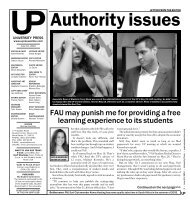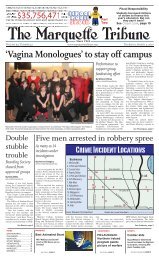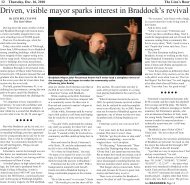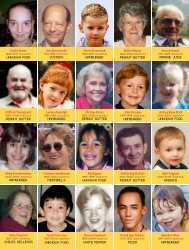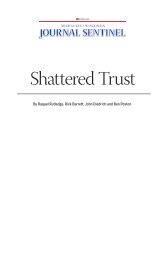THE YANKEE COMANDANTE
THE YANKEE COMANDANTE
THE YANKEE COMANDANTE
Create successful ePaper yourself
Turn your PDF publications into a flip-book with our unique Google optimized e-Paper software.
upset Morgan, she told him that she was<br />
being held prisoner in their home, and<br />
that she had little water or food. “No one<br />
is allowed to visit,” she said. “The babies<br />
are sick.”<br />
Morgan urged her to flee—to get the<br />
children out of Cuba before it was too<br />
late. “If you can, go to Toledo,” he said.<br />
“My mother will help you.”<br />
He took her hand. “Everything’s<br />
going to be O.K.,” he said. But Rodríguez,<br />
who rarely betrayed fear, was scared.<br />
“I was so worried about him and what<br />
would happen to our baby girls,” she recalls.<br />
After five minutes, the guards said<br />
that her time was up.<br />
“I love you with every part of me,” he<br />
said. They stole a kiss before being<br />
separated.<br />
That night, when Rodríguez returned<br />
home, she crushed sleeping pills into<br />
hot chocolate and offered the drink to the<br />
men guarding her. At two in the morning,<br />
when all the guards appeared to be<br />
asleep, she gathered her daughters.<br />
“Hush,” she whispered to them. When<br />
the baby began to cry, she gave her a toy,<br />
and then, carrying both girls in her arms,<br />
she crept out of the house. She went to the<br />
Brazilian Embassy, where she was given<br />
sanctuary after telling the Ambassador<br />
and his wife, “Please, I’m in big trouble.”<br />
Morgan was also trying to break free.<br />
He studied the design of La Cabaña and<br />
the routine of the guards, looking for a<br />
flaw in the system. “Morgan had all kinds<br />
of escape plots,” another prisoner later<br />
told the C.I.A. Morgan worked to regain<br />
his strength. A press attaché at the U.S.<br />
Embassy later wrote, “Up at dawn, he<br />
would put himself through calisthenics,<br />
then march around the compound,<br />
shouting commands at himself.” The inmate<br />
who had given Morgan painkillers<br />
recalled, “He exercised like an athlete and<br />
marched like a soldier.” Morgan turned<br />
increasingly toward his Catholic faith.<br />
He wore a rosary and often prayed.<br />
Hiram González, a twenty-four-yearold<br />
revolutionary who had been arrested<br />
for conspiring against the regime, had<br />
just arrived at La Cabaña, and watched in<br />
despair as prisoners were taken out and<br />
killed by firing squads, while birds<br />
swooped down to “peck at the bits of<br />
bone, blood, and flesh.” Morgan, he recalls,<br />
tried to cheer him up, offering his<br />
mattress. When Morgan found him crying<br />
in a corner, he went up to him and<br />
said, “Chico, men don’t cry.”<br />
“At times like this, I’m not a man.”<br />
Morgan put his hand on his shoulder.<br />
“If it helps your suffering, then it’s O.K.”<br />
Morgan walked him around the prison<br />
yard until he felt better. “He was the only<br />
one to help,” González recalls.<br />
Two days later, on March 9, 1961,<br />
guards seized Morgan and escorted him<br />
across the compound to a room where a<br />
military tribunal was being held. Along<br />
the way, Morgan, trying to summon<br />
courage, murmured song lyrics to himself:<br />
“Over hill, over dale, we have hit the<br />
dusty trail/And those caissons go rolling<br />
along.”<br />
There were eleven other defendants at<br />
the tribunal, including Carreras. Rodríguez<br />
was tried in absentia. A few weeks<br />
earlier, Che Guevara had published an<br />
essay denouncing members of the Second<br />
Front. “Revolutions, accelerated radical<br />
social changes, are made of circumstances,”<br />
he wrote. “They are made of<br />
passions, of man’s fight for social vindication,<br />
and are never perfect.” The mistake<br />
of the Cuban Revolution, Guevara argued,<br />
was its accommodation of men like<br />
the Second Front commanders. “By their<br />
presence, they showed us our sin—the sin<br />
of compromise...in the face of the actual<br />
or potential traitor, in the face of those<br />
• •<br />
weak in spirit, in the face of the coward.”<br />
He went on, “Revolutionary conduct is<br />
the mirror of revolutionary faith, and<br />
when someone calls himself a revolutionary<br />
and does not act as one, he can be<br />
nothing more than heretical. Let them<br />
hang together.”<br />
At the trial, Morgan and Carreras<br />
were charged with conspiracy and treason.<br />
Later, Fabián Escalante, who served<br />
for many years as the head of Cuban<br />
counter-intelligence, detailed the case<br />
against Morgan, claiming that he had<br />
been a longtime American intelligence<br />
operative—a “chameleon”—who, in<br />
1960, had attempted to “organize, for the<br />
C.I.A., a band of counter-revolutionaries<br />
in the Escambray.”<br />
Without a doubt, the C.I.A. was trying<br />
to foment the new insurgency in the<br />
mountains. But U.S. documents, which<br />
have since been declassified, suggest<br />
that Morgan was never a C.I.A. operative.<br />
Indeed, an agency memorandum<br />
dated October 5, 1960—two weeks before<br />
Morgan’s arrest—voiced “strenuous<br />
objections” to the idea of using him.<br />
This followed an inquiry by Army intelligence,<br />
which had concluded that<br />
enlisting Morgan would be “extremely<br />
worthwhile.” (The Army had considered<br />
sending him a “secret writing system”—most<br />
likely, one involving invisi-<br />
<strong>THE</strong> NEW YORKER, MAY 28, 2012 67



